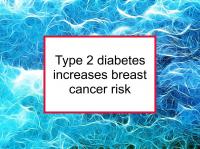Type 2 diabetes has been reported to increase the risk of breast cancer, especially in postmenopausal women. Many women with type 2 diabetes are obese, which also increases risk among postmenopausal women. However, type 2 diabetes increases breast cancer risk even in normal weight women. Type 1 diabetes does not appear to be associated with increased risk.
Women with type 2 diabetes also tend to be diagnosed with breast cancer at later stages than non-diabetics.
The combination of high total cholesterol and type 2 diabetes appears to be more potentially harmful than either condition alone. High-density lipoprotein (HDL, the “good” cholesterol) from breast cancer patients with type 2 diabetes has been shown to promote one of the first steps in metastasis in cell and animal studies.
Hyperinsulinemia, insulin resistance, and diabetes have all been found to be associated with poor breast cancer outcomes. High levels of fasting glucose at diagnosis have also been found to be associated with increased risk of recurrence compared to normal levels. One large Finnish study reported that the risk of breast cancer-specific death was 36% higher among women with diabetes compared to those without diabetes. A 2025 study reported that high glucose promoted resistance to cisplatin chemotherapy in triple negative breast cancer cells and increased their aggressiveness.
Women with type 2 diabetes can potentially reduce their risk of recurrence by taking steps to reduce insulin resistance and circulating insulin, as well as keeping their blood sugar under tight control. This can be accomplished in part through appropriate diet, regular exercise, and losing weight if overweight.
Metabolic syndrome
Metabolic syndrome is a state of insulin resistance characterized by high waist-to-hip ratio, high body mass index (BMI), high triglyceride level, low HDL cholesterol, above normal fasting glucose, hypertension and polycystic ovarian syndrome. Not all of these factors have to be present for a diagnosis of metabolic syndrome. Elevated leptin (a fat metabolism hormone) levels are also associated with metabolic syndrome. People with the metabolic syndrome have a five-fold increased risk of developing type 2 diabetes.
Insulin resistance
People with obesity, metabolic syndrome, glucose intolerance, and/or type 2 diabetes normally are insulin resistant. This means that a given level of insulin produces a lower-than-expected biological effect. Therefore, the body requires more insulin to control blood sugar and the pancreas will respond by increasing insulin secretion as long as it is able (in later stages of type 2 diabetes, the pancreas starts to give out and insulin shots are required to obtain the level necessary to control blood sugar).
Diabetes treatments
Metformin
Women taking metformin to treat type 2 diabetes have been reported to have lower risk of breast cancer, although not all studies are in agreement. The prognosis of diabetic women has also been reported to be improved by taking metformin, including among those with hormone receptor positive (ER+/PR+), triple negative (ER-/PR-/HER2-) and HER2-positive (HER2+) breast cancer. However, there is evidence that metformin might not have such effects in women without insulin resistance.
Metformin has been shown to inhibit aromatase activity, thereby inhibiting the production of estrogens from androgens within the body, which could be beneficial for postmenopausal women with ER+ disease. Metformin has also been reported to reduce estradiol (E2) levels, independent of BMI.
Metformin has been reported to increase the effectiveness of radiotherapy. Diabetics taking metformin have also been reported to have better response to chemotherapy than other diabetics. One study found that metformin counteracted resistance to doxorubicin chemotherapy in both ER+/PR+ and triple negative breast cancer cells. A 2021 study found that metformin enhanced cisplatin toxicity. However, a 2020 study determined that metformin had the potential to interfere with the effectiveness of both doxorubicin and paclitaxel.
Metformin has complex interactions with breast cancer and, as noted above, there is evidence that it might not be helpful in women without insulin resistance. A major 2023 study found that metformin taken for five years did improve disease–free survival among women with early stage operable breast cancer who did not have type 2 diabetes. A 2024 study reported that metformin might actually elevate the likelihood of developing ER+ and HER2- breast cancer.
Insulin glargine (Lantus) and insulin
Some studies have reported that long-term use of insulin glargine (Lantus) is associated with increased risk of breast cancer and breast cancer recurrence. The association between diabetes and increased risk of recurrence also appears to be greater among short-acting insulin users. One study reported that use of medications such as metformin to treat type 2 diabetes appears to reduce breast density, whereas taking insulin might increase it. A 2023 study reported that insulin reduced the treatment effects of doxorubicin. This is a controversial topic and not settled. For example, one study using a mouse model of type 2 diabetes and breast cancer reported that insulin glargine at high concentrations did not promote the progression of breast tumors.
Tamoxifen
One study has reported that tamoxifen use in older breast cancer survivors is associated with an increased risk of type 2 diabetes.
Sources of information in this webpage
The information above, which is updated continually as new research becomes available, has been developed based solely on the results of academic studies. Clicking on any of the underlined terms will take you to its tag or webpage, which contain more extensive information.
Below are links to 20 recent studies concerning this topic. For a more complete list of studies, please click on type 2 diabetes.
